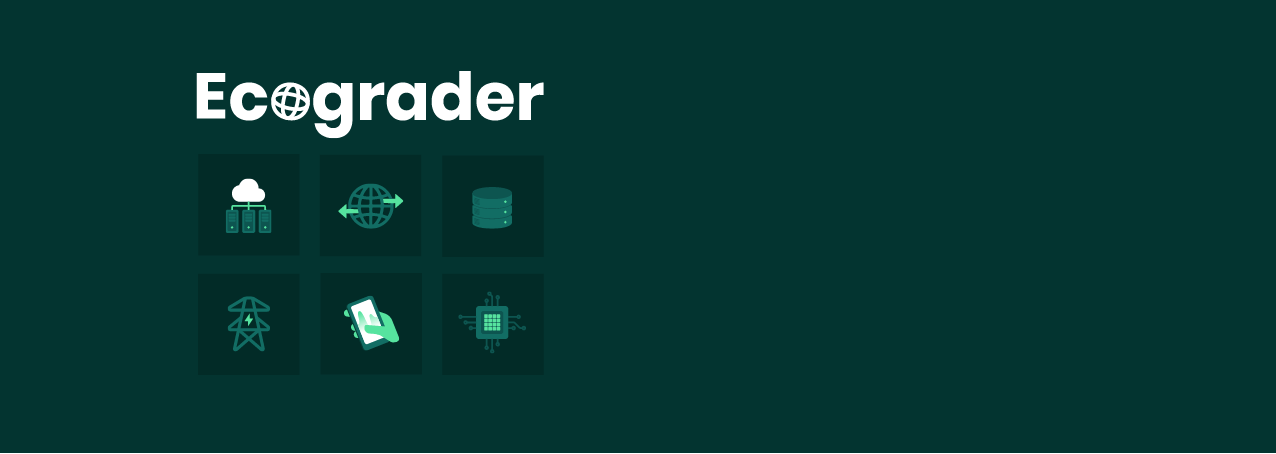
Reducing the internet’s significant environmental impact one URL at a time
The Story of Ecograder
Ecograder provides free web sustainability reports for millions of websites. Here’s Mightybytes’ story on creating and improving this unique digital sustainability product.
Improving
Web Sustainability
Inspired to help people better understand and take action on the web’s massive environmental impact, Mightybytes created the original Ecograder through a series of mini-sprints in early 2013.
We have since improved the product to help organizations of all sizes across industries:
- Track and reduce emissions and energy use associated with digital products and services
- Improve website speed, performance, and efficiency
- Reduce costs, data, and resources associated with digital product management
Key
Points
62,733
Reports Generated
Ecograder provided 62,733 web sustainability reports in 2024.
65
Average Score
The average Ecograder score from these reports was 65 out of 100.
46%
Green Hosting
Percentage of these websites using hosting powered by renewable energy.
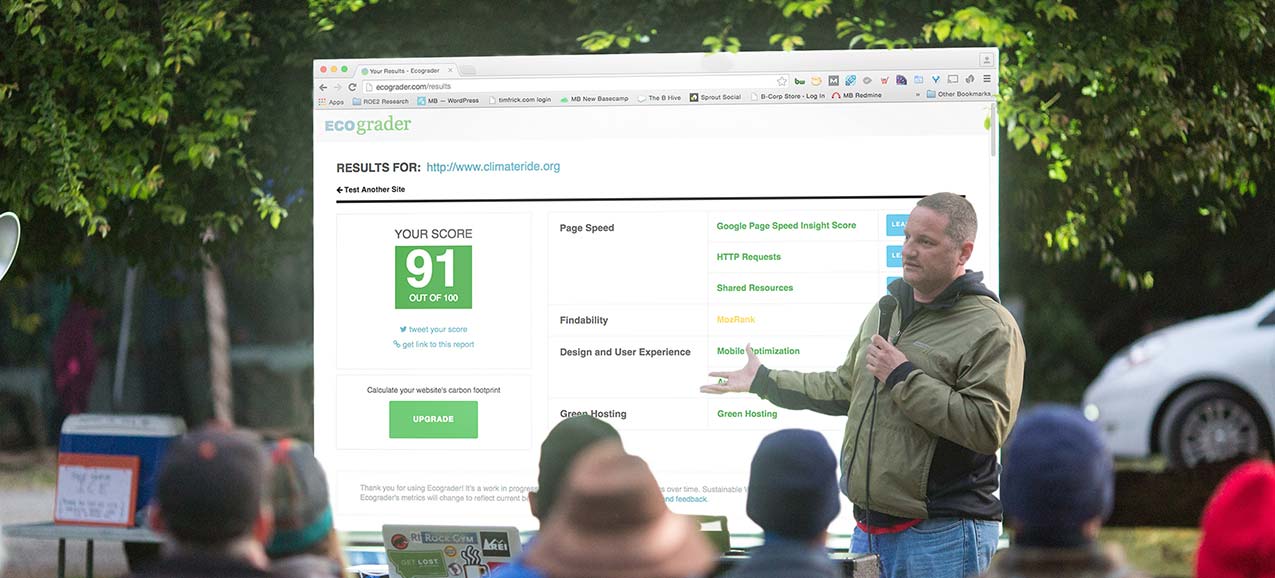
Ecograder
“Classic”
Our vision for Ecograder has always been to provide a simple experience that anyone can use to better understand the environmental impact of a digital product or service.
As an educational tool, Ecograder helps people quickly comprehend a complex and often misunderstood topic. Plus, we intentionally made Ecograder very easy to use with a simple three-step process.
- Input a URL
- Click submit
- Receive a report
Ecograder’s original reports included a page score alongside specific actions you could take to improve performance and efficiency. These were based on a few simple concepts:
- Everything we do on the web requires electricity.
- Most of that energy comes from fossil fuels.
- Improving efficiency and performance can help decrease energy use and emissions.
The internet is, of course, a very complex ecosystem. Meaningfully addressing web-related emissions or energy use isn’t as simple as the three steps noted above.
However, our vision has always been to provide straightforward, actionable reports that anyone can understand with the hope that teams will use this data to implement change.
This represents the most common way Ecograder is used today.
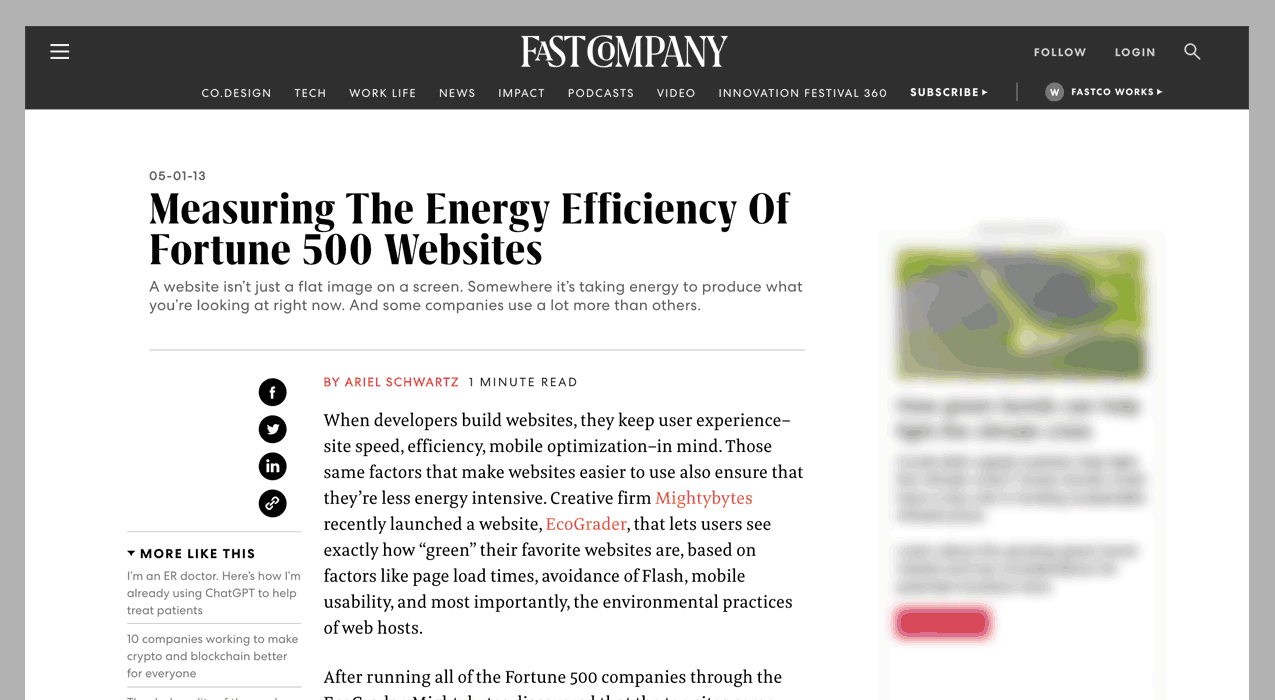
Educating
Stakeholders
As part of the Earth Day 2013 launch, Mightybytes ran the websites of Fortune 500 companies through Ecograder to see how they performed.
Fast Company, Chicago Sun-Times, and several other media outlets picked up the story. This brought both attention (and notoriety) to Ecograder, as some companies didn’t appreciate the publicity generated by their poor-performing websites.
This quickly increased Ecograder use. It also helped to educate the web community and general public at large on the then emerging topic of the web’s environmental impact.
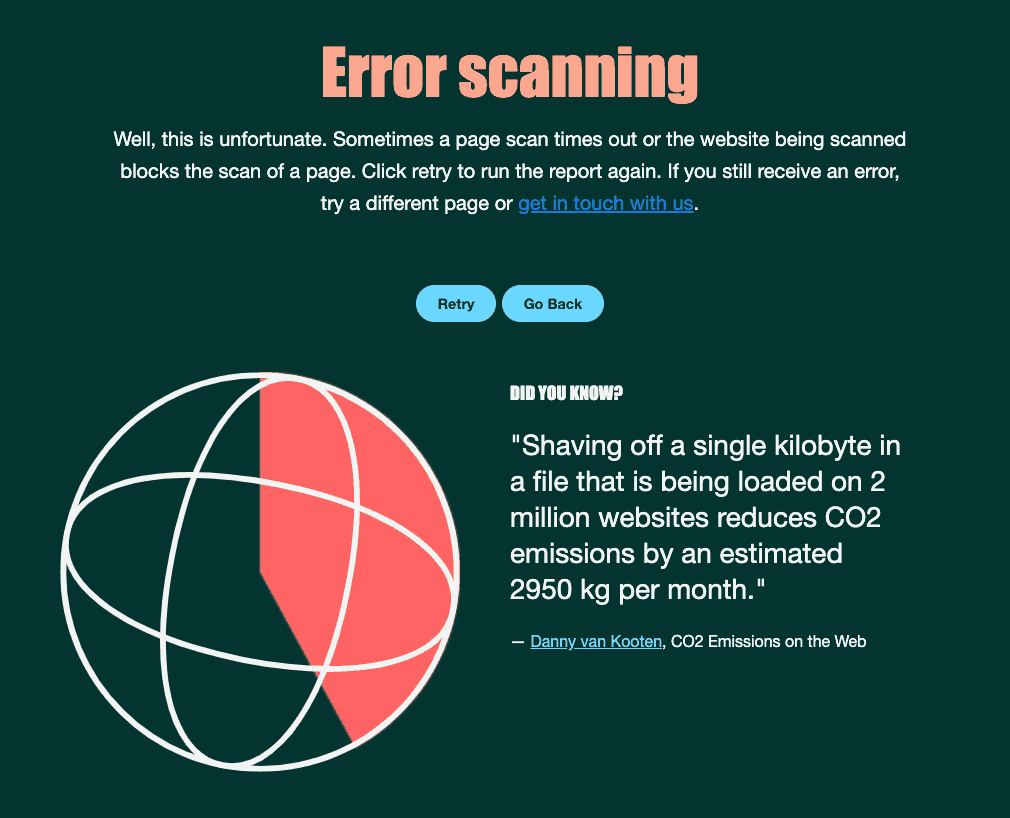
Product
Roadblocks
All products have blockers. As time passed, we struggled to add new features and maintain the platform’s stability while also balancing the needs of a growing digital agency dedicated to supporting its clients.
However, we remained committed to bootstrapping Ecograder in order to stay true to our vision and create a tool that would, first and foremost, educate stakeholders. However, without the help of external funding, progress was slow.
During this time, we also used Ecograder data to produce several annual reports on the state of internet sustainability. In creating these reports, we learned that Ecograder’s admin didn’t support pulling data efficiently.
Then, the global COVID-19 pandemic helped us find both time and inspiration to take Ecograder—and Mightybytes—to the next level.
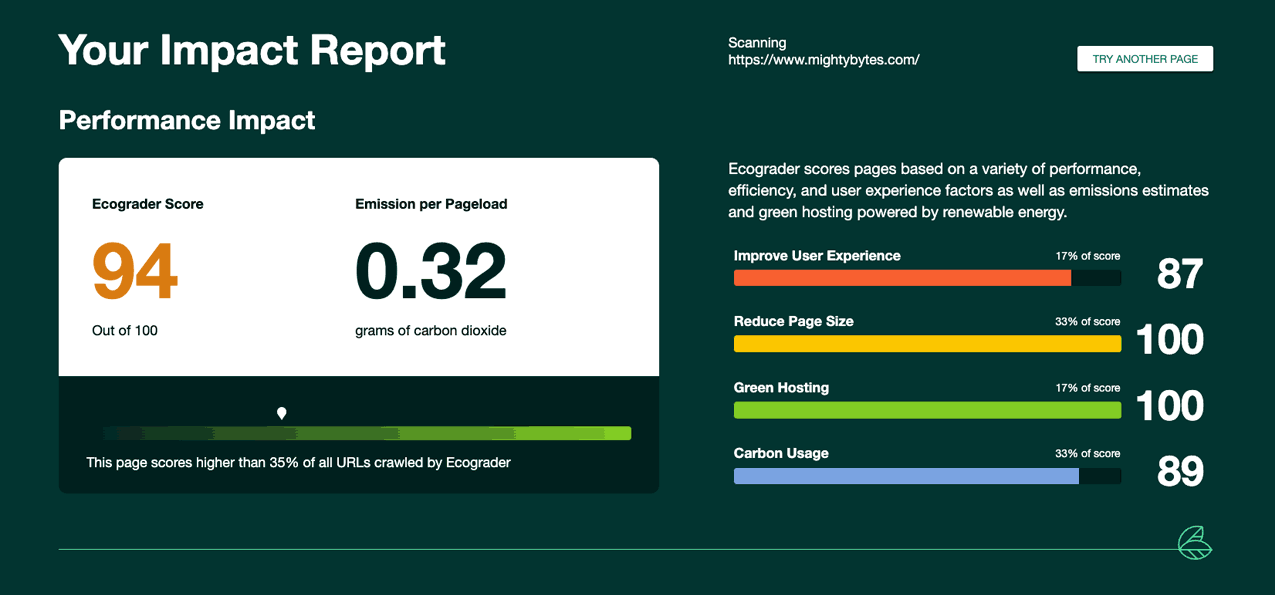
A New Path
Forward
When COVID-19 struck, global awareness of our collective digital footprint grew on account of several new research studies, increased topical media coverage, and billions of people working from home to stay safe.
With several pending projects on hold due to the pandemic, we decided to devote time and resources to upgrading Ecograder.
This entailed the following:
- User research: We conducted interviews and ran web community surveys to better understand what people might want from a web sustainability tool.
- User testing: Running user tests on new ideas helped us learn firsthand what might make Ecograder even more effective.
- Data analysis: We distilled a large amount of research data to find insights related to potential product features and user goals.
In turn, this informed a complete product redesign. New Ecograder features in this redesign include:
- Emissions estimates: Based on the data model we devised with Wholegrain Digital, the Green Web Foundation, and others, Ecograder now provided broad stroke estimates for page-based emissions.
- Actionable metrics: A more comprehensive list of metrics to increase website efficiency and improve page performance helped users improve their websites and other digital products.
- Intersectionality: Ecograder reports also provided high-level metrics for intersectional issues like search performance and accessibility to help people integrate sustainability with other optimization efforts.
- Improved UI: A redesigned and more intuitive user interface helps people better understand reports and the associated actions they should take.
- Better admin: Product administration tools allowed for better data tracking and analysis and easier exports for reports and data storytelling.
Similarly, as part of our last B Corp certification, Mightybytes implemented several impact business models, one of which focuses on digital sustainability. This helps us incorporate Ecograder and other digital sustainability data into client reporting and projects we execute for clients, like the sustainability audit we conducted for DePaul University.
While we divest from fossil fuels and tech monopolies, we must also invest in the social foundation that the internet provides and advocate for digital equity, meaningful connectivity, and open alternatives. We see this work happening in collaboration with movements for digital rights, an open internet, climate justice, free/open knowledge commons, public interest technology and equitable energy.
— The Green Web Foundation
Accelerating a Just
Green Transition
Ecograder was born in 2013 from a need to educate people on the web’s significant environmental impact. We’ve come a long way since then.
However, big hurdles still exist to achieve the green transition we need to meaningfully address the climate crisis. In our inudstry alone, the explosion of generative AI has, in turn, fueled rapid expansion of hyperscale data centers, which use exorbitant amounts of water and energy.
We hope that Ecograder can play a small but meaningful role in accelerating this transition. In order to effectively support this, the product also needs a sustainable business model. To this end, Mightybytes has been developing a much more robust pro version to help users:
- Incorporate W3C’s Web Sustainability Guidelines
- Integrate website analytics
- Crawl full websites or a range of URLs
- Schedule crawls
- Create task lists
- Monitor improvements over time
This version is now in beta. Feel free to kick the tires as we prepare for a full launch.